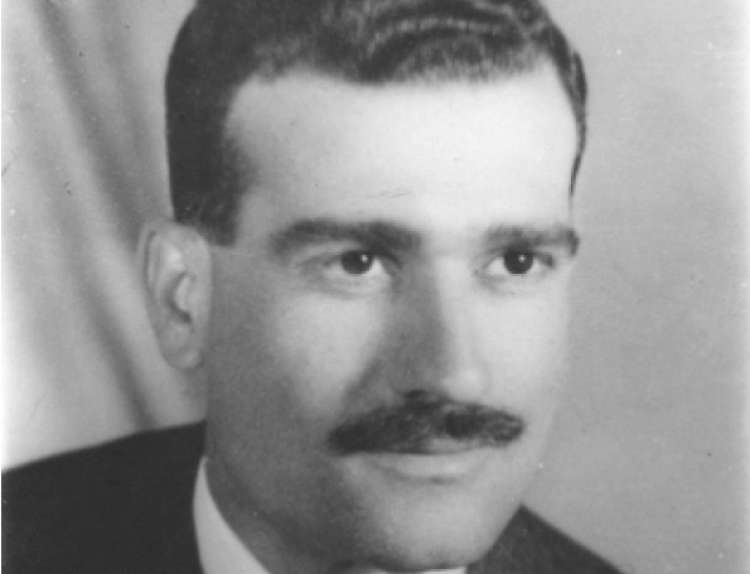Widow of Spy Eli Cohen in Heartbreaking Interview: "Our Children Never Knew Their Father"
How did Nadia Cohen, the widow of Eli Cohen, raise their three children, and what did he write in his final letter to her? An interview with 83-year-old Nadia on Eli Cohen's mysterious life and work as a top Israeli spy caught in Syria.
 In circle: Nadia Cohen (Photo: Flash 90)
In circle: Nadia Cohen (Photo: Flash 90)"My dream is for Eli's bones to be brought to Israel, so that they may rest on the land he fought and paid for," says Nadia Cohen (83), the widow of the top Israeli spy Eli Cohen, painfully. "I am grateful that efforts are being made to commemorate him. The nation remembers his courage and deeds for the state and the people. Now the commemoration comes from the people."
Recently, Nadia approached the President of Syria, Bashar al-Assad, requesting forgiveness and agreement to transfer her husband's remains to Israel for burial. She hoped that the bloody civil war, which claims casualties daily, would soften the Syrian president's heart. "I approached President Assad twice," she says this week, "the appeal came from a broken heart. Because of my age, because the years go by, and because of the turmoil in Syria and what happens to his people and the casualties - I thought something in his heart would change. I have not received a response until today."
Kamel Amin Thaabet – The Shadow Man
Eliyahu (Eli) Cohen was executed on May 18, 1965. Cohen was one of the senior Israeli spies operating in Syria, and was executed after being caught. Cohen was born to Shaul and Sofia Cohen in Alexandria, Egypt. His father, Shaul, came to Egypt at the age of seven, from Aleppo, Syria. Eli studied at the Rambam Jewish High School in the city, and then was admitted to study engineering at the University of Alexandria. In 1944 he joined the Zionist movement and thirteen years later immigrated to Israel, living in Bat Yam. He made a living as a translator of Arabic press in the AMAN (Intelligence Corps) and later in accounting at the "Mashbir Central". In 1959, he married Nadia, an immigrant from Iraq who was 11 years younger. She is the sister of the Israeli author Sami Michael.
After his arrival in Israel, Cohen was recruited to the operational unit of the IDF Intelligence Corps and trained as a spy. In 1961, he was sent to Argentina where he assumed the identity of a Syrian Arab businessman, Kamel Amin Thaabet. Cohen managed to integrate himself into the local Arab community, befriending several influential figures from the Syrian expatriates in the area. In January 1962, he moved to Damascus in the guise of a Syrian native returning after many years abroad, and rented an apartment near the Syrian General Staff to monitor its activities more easily. According to publications, American intelligence documents reveal that the man who accompanied him to Damascus was a Syrian named Majd Sheikh al-Ard, who served as a source and received a salary from American intelligence.
 (Photo: IDF and Defense Ministry Archive)
(Photo: IDF and Defense Ministry Archive)Kamel Amin Thaabet built a reputation as a generous businessman and patriotic nationalist, befriending military personnel and high-ranking officials from the Syrian elite, with whom he toured Syria. Through his connections, he gathered information on the Syrian military and leadership, and Syria's connections with Palestinian terrorist organizations. Every six months, he traveled to Europe on business trips, which allowed him to meet with his handlers and visit his family in Bat Yam.
During those years, Nadia raised their three children alone. They never knew their father. "Throughout all the years, I did not work, I had very difficult years at the beginning of my life with Eli. I had to raise the children, and later I was not of age to start working. All my attention was to commemorate Eli."
Nadia did not start another family or remarry. "I cannot forget him because I know him more than anyone else. I knew the desire and burning to serve the country. The honest man with a smile on his face and lips. Eli was such a person that if there was one spoon of food - he would share it. He was always in a good mood, always wanted to give to the country, to friends, and to family. His personality cannot be forgotten. I don't think I would have found another person in his place, and in general - it wasn't in my mind. I did not start another family and was not built for it. I went through a very difficult journey."
"My journey was difficult when he functioned in Syria, and I was alone in pregnancies and births of my children. I had no one to share with, talk to, pour my heart and not my tears. Those were not easy years at all. Only after his death could I cry and shout. Before that, I couldn’t unload. They would ask me: 'Where is he?', 'What is he doing?' I could not say."
When Eli first left for Syria, Nadia was a young woman at 25. The couple had two daughters and a son, who never met their father. Currently, they have six grandchildren and a great-granddaughter. "I miss everything, his vitality, his caring. I am sure that if he had stayed alive we would have been an encircled family, he would have told me today: 'See, there were hard years, and look how it ended and we are together.'"
The Last Request: "Pray for the Elevation of My Soul"
Until now, no official details have been published about the circumstances of his capture. What is known is that about four months after Cohen was captured, on May 18, 1965, at 2:00 AM, a small military convoy moved through the streets of Damascus, the capital of Syria. After a short drive, the convoy stopped at the police station, opposite Al-Marja Square at the city center, and officers, including those who served as judges in the military tribunal that sentenced Cohen to death, as well as journalists and photographers allowed to document the last hours of the highest-ranking Israeli spy captured in Syria were rushed to the scene. Rabbi Nissim Andibo-Cohen, the head rabbi of the Jewish community of Damascus, prayed with him the customary prayers. According to publications, the rabbi later testified that he met a broken man, yet a determined man who asked to inform his family that he fulfilled his duty completely and remained loyal to his people and country.
Cohen was then led to the center of Marja Square, where Abu Suleiman, the chief executioner of Syria, awaited him. In a letter he wrote to his wife shortly before his execution, he wrote: "My dear Nadia, my beloved family! I write to you these last words hoping you will always stay united. I ask my wife to forgive me, to take care of herself and to give our children a good education... One day my children will be proud of me. And you, my dear Nadia, please marry another man who will be a father to our children, according to your will. Do not waste your time crying over what happened, but look to the future. I send you last kisses. Pray for the elevation of my soul."
Nadia recalls this week: "A month and a half before they killed him, he tried to save himself, and there was no one to tell him: 'Okay, you did enough, you have children, enjoy them.' They sent him right back to the arms of the Syrians." When he traveled for the last time, Nadia knew it was a farewell: "We talked a little and cried a lot. He was not surprised when the Syrians staged as if they were surprised, they were waiting for him. Eli was a brilliant man, with special senses. He had a joy of life that was impossible to contain. He was considerate and good. The children didn’t know him. They grew up with the memory, stories, and interviews."
"Of course, it was important to me that they knew who their father was. I and my three children grew up with many silences, pain that cut through our soul. There was no close, loving, and caressing father. That broke us. A child of four or five did not receive a caress from his father while seeing his friends and neighbors or family members with their fathers. They would look with sad eyes because only they didn’t have a father, their father was a hero but absent, he belonged to someone else." Nadia is the sister of the author Sami Michael. She herself does not engage in writing. "I do not write, I only speak, my brother is a writer. We have a good relationship. We are loving siblings and we are together. I read his books."
According to publications, former Defense Minister Avigdor Lieberman approached Russian President Vladimir Putin, asking for assistance to bring Eli Cohen's remains to Israel. Nadia: "During his tenure as defense minister, whenever he met with Putin, he would raise the request. Also, the Mossad chiefs and the Prime Minister worked in their way to bring his remains. I assume everyone would be happy to bring Eli and claim that honor for themselves, but Eli was abandoned in life and death. I always talk about it. I am a dreamer, I daydream or at night, but everything is empty."
"I live my husband, he will always be my husband and always the one who worked, a shadow man, and when the time came to descend he wasn’t allowed, and that burns me. His ears and eyes were all to hear every piece of information, and birds-eye flight his heart was with his country, his children, and his family."
"Eli's Commemoration Comes from the People"
Over the years, Eli Cohen has been commemorated in several ways: a memorial was erected in his memory at the Missing Persons Garden in the National Military Cemetery on Mount Herzl in Jerusalem. Eli Cohen Path in the Golan Heights, and his life story is also commemorated at the International Spy Museum in Washington, D.C.
Additionally, the settlement of 'Eliad' in the Golan Heights is named after him, as well as many streets in Israeli cities, including Jerusalem, Tel Aviv, Haifa, Herzliya, Ramat Hasharon, Ashkelon, and other places. The street he lived on in Bat Yam has also been renamed after him. In addition, synagogues, public gardens, and the "Noam Eliyahu" school have been named after him. In 2001, the Israel Medals and Coins Corporation issued a state medal in his memory. In 2008, a school was inaugurated in Netivot and a learning center in Kiryat Malachi in his memory. In 2009, the Bat Yam municipality, Eli Cohen's city, announced the establishment of a museum in his memory. As mentioned, last week it was announced that the Bat Yam train station will be named after him.
Were you moved when you heard about the initiative to commemorate Eli at the Bat Yam train station?
"I once worked for it, today the people commemorate him. I was moved when the Minister of Transportation awarded me a certificate of appreciation. He told me: 'You know, it doesn’t come from Bat Yam or me, we sat and suggested names and said Bat Yam is Eli Cohen.' He told me that the people wanted to commemorate him. The people repay him with recognition and honor. Eli was one of the people, he loved his people, the ordinary person."

